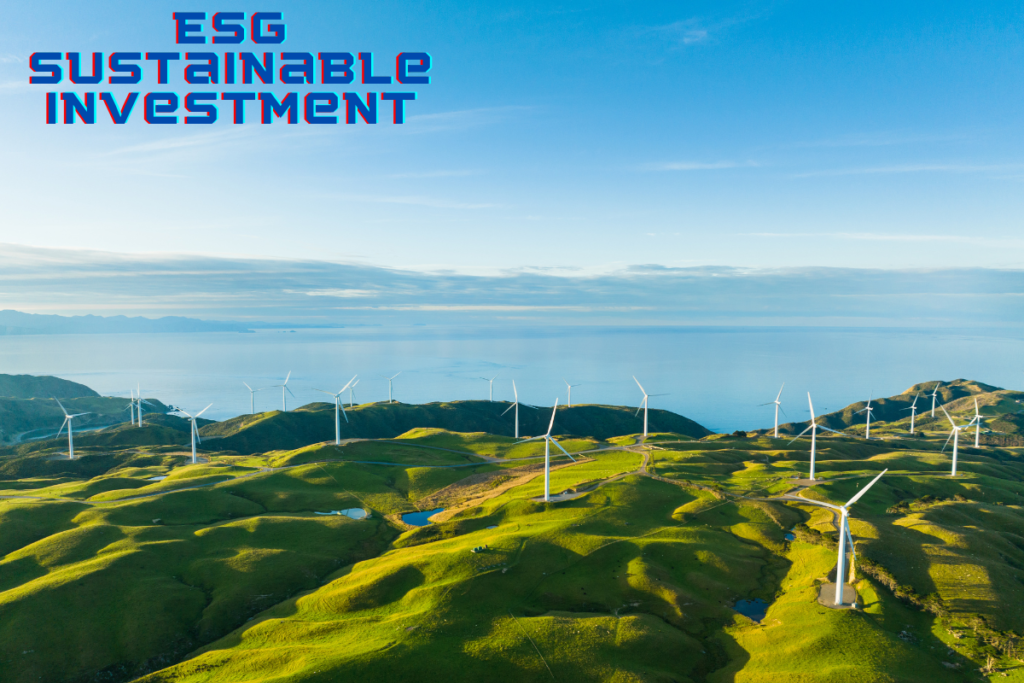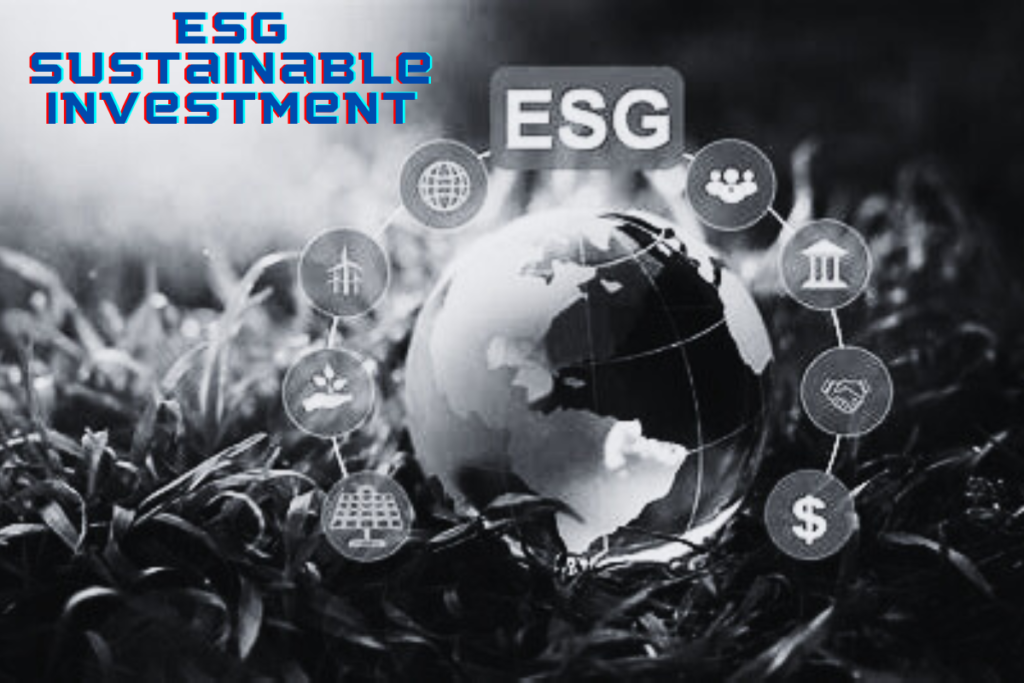Introduction:
“Dive into the world of sustainable investing with our guide, ‘ESG 101: Exploring Environmental, Social, and Governance Sustainable Investing’. Discover how ESG factors are shaping the investment landscape and learn how to make socially responsible investment decisions. Let’s embark on this journey together towards a more sustainable future.”

Define the ESG (Environmental, Social, and Governance)?
ESG means Environmental, Social, and Governance. Company actions and processes are assessed for sustainability and morality using these factors.
Here are all the parts:
Environmental:
How well a company treats the environment. Energy utilization, carbon footprint, waste management, resource efficiency, and environmental legislation are examined.
Social:
This element examines how a company treats its employees, customers, suppliers, neighbors, and other stakeholders. Human rights, product safety, diversity, inclusion, working conditions, and community involvement are examples.
Governance:
Assessing a company’s leadership, management, and internal controls. A diverse board, fair CEO pay, shareholder rights, honest financial reporting, and ethical behavior are examples.
ESG 101 criteria can reveal a company’s sustainability, responsibility, and long-term viability to investors and other stakeholders. People believe companies that prioritize ESG are more stable, moral, and successful in the long run.
How to define "Sustainable Investing"?
This investment strategy considers ESG considerations and financial rewards. SRI or ESG 101 investing is another name for it. Sustainable investing aims to improve the world while making money.
Sustainable investors seek companies that prioritize ethics, sustainability, and social good. This could involve investing in companies that care about the environment, have excellent social programs, support good governance, or address global concerns like climate change, social inequality, and human rights.
Sustainable investment approaches include ESG integration, negative or positive screening, impact investing, thematic investing, and shareholder involvement. By investing with ESG factors, people and corporations may help preserve the future. They may also profit.
How ESG is helpful in "Sustainable Investing"?
ESG (Environmental, Social, and Governance) considerations are crucial to sustainable investing for several reasons:

Risk Management:
ESG elements help buyers understand firm investment risks and potential. ESG-performing companies are better able to address environmental and social risks such regulatory changes, supply chain issues, and brand damage.
Long-Term Performance:
Studies suggest that organizations with strong ESG scores outperform their competitors over time. ESG 101 considerations help investors locate companies that can capitalize on sustainability trends, innovate, and create long-term value.
Impact:
Sustainable investing makes money while benefitting people and the planet. Investing in ESG-friendly companies can improve the planet. Climate action, diversity, inclusiveness, community development, and ethical governance are examples.
Stakeholder Engagement:
ESG-focused companies connect more with investors, workers, customers, and communities. ESG discussions with management and shareholder resolutions can make organizations more transparent, accountable, and open to change.
Sustainable investing’s ESG 101 components help investors align their finances with their ideals. They also promote sustainable corporate practices, reduce risks, improve long-term performance, and improve the world.
Define "Risk Management" and how it affects "ESG Sustainable Investing"?
Risk management finds, evaluates, and reduces risks to a person or organization’s goals, projects, or investments. It involves examining unknowns and planning to reduce undesirable outcomes and increase favorable outcomes.
Risk management is crucial for ESG sustainable investment in many ways:
Identifying ESG Risks:
Businesses might face environmental disasters, societal issues, governance scandals, and regulatory fines. Investors can identify and assess these risks to see how they may damage the company’s image and financial performance using ESG factors.
Mitigating Risks:
Financial, operational, and social risks are higher for companies that don’t follow ESG. Sustainable investors choose organizations with excellent ESG measures, risk management systems, and governance frameworks to reduce these risks. Sustainable enterprises reduce ESG risks for investors.
Contributing to Long-Term Resilience:
ESG-focused companies are better suited to endure climatic change, societal upheaval, and legal changes. Sustainable investment supports companies with long-term business models, morality, and proactive risk management.
To conclude, ESG sustainable investing risk management involves identifying ESG risks, decreasing their potential harm, and strengthening investment portfolios. Using ESG elements to manage risk helps investors reconcile financial aims with environmental, social, and government interests.
How to define "Long-Term Performance" and how does it affect "ESG Sustainable Investing"?.
Long-term success means an investment or portfolio can make money and appreciate over several years or decades. It looks at consistent progress, solid finances, and the ability to handle market changes or foreign shocks.
ESG sustainable investing’s long-term performance depends on environmental, social, and governance factors like as below:
Sustainability:
Companies that prioritize ESG 101 considerations tend to operate sustainably, which can improve their long-term performance. These organizations can run efficiently, handle risks properly, and take advantage of opportunities in changing marketplaces because they prioritize social responsibility, environmental protection, and good governance.
Resilience:
ESG considerations can help firms battle climate change, new rules, changing client tastes, and societal issues. ESG-performing companies are more likely to adapt to changing situations, manage new risks, and outperform the competition.
Stakeholder Trust:
When a company cares about ESG issues, shareholders like it more. Including investors, customers, employees, and communities. Trust improves image, brand loyalty, staff retention, and shareholder trust, which can help the organization succeed.
Value Creation:
Sustainable investing makes money while helping society and the environment. Investing in ESG-friendly companies can help build wealth. This balances financial interests with ethics and society.
ESG elements encourage sustainability, resilience, stakeholder trust, and wealth generation, making them crucial for long-term sustainable investing success. ESG elements can help investors generate money and improve the environment and people in the long run.
What is "Impact" and how does it affect "ESG Sustainable Investing"?.
ESG (Environmental, Social, and Governance) sustainable investing defines “impact” as intended and measurable positive social and environmental impacts. Impact investing goes beyond the return on an investment. It examines its effects on society, the environment, and neighborhoods.
Impact is related to ESG sustainable investment:
Environmental Impact:
ESG sustainable investing supports environmentally conscious companies. Investors like green energy, resource efficiency, pollution reduction, and other environmental practices. Investors can delay climate change, safeguard species, and clean up the world by doing this.
Social Impact:
The social impact of investments is another ESG factor. Diversity, inclusiveness, human rights, company social responsibility, community development, and labor practices are included. Investors in socially conscious enterprises can empower underrepresented communities, promote social justice, and promote constructive social change.
Governance Impact:
Governance aspects enable transparency, accountability, and ethical corporate decisions, which are crucial to affect investment. Effective governance comprises a diverse board, fair executive pay, and anti-corruption laws. These foster trust, reduce risk, and sustain sustainability.
ESG sustainable investment considers effect, so investors may align their financial goals with their values and future aspirations. Impact investment enables people invest in firms that are improving the world and solving major social and environmental issues. This approach makes investing more reliable, responsible, and inclusive, benefiting investors and society.
what is "Stakeholder Engagement" and how does it affect "ESG Sustainable Investing"?.
A company’s operations, choices, and results effect people, groups, and organizations. “Stakeholder engagement” means involving. Stakeholders include investors, employees, consumers, suppliers, communities, regulators, advocacy groups, and others interested in a company.
Environmental, Social, and Governance (ESG) sustainable investment requires stakeholder involvement in numerous ways:
Transparency and Accountability:
Companies that discuss ESG 101 issues with stakeholders demonstrate transparency and responsibility. By sharing their social, environmental, governance, and sustainability goals with stakeholders, companies may develop confidence and credibility.
Investor Confidence:
Stakeholder involvement boosts investor confidence in a company’s ESG performance. Investors prefer companies that engage stakeholders, address their concerns, and respond quickly. Strong stakeholder relationships demonstrate a company’s commitment to environmental sustainability and management.
Risk Mitigation:
Stakeholders help companies identify and address ESG issues. By polling various stakeholder groups, companies can learn about environmental, social, and governance issues that potentially impact their operations or image. Considering these risks beforehand can boost long-term success and resilience.
Value Creation:
Business and investor engagement with stakeholders fosters fresh ideas, trust, and long-term connections. Stakeholder involvement in decision-making, product development, and sustainability activities helps companies improve society, retain customers, and stand out in the market.
Stakeholder involvement in ESG sustainable investment helps build relationships, manage risks, increase transparency, and create value. Genuine and open stakeholder engagement can improve ESG performance, meet stakeholder demands, and make company more sustainable and responsible.
How it can be evaluated that the ESG is Investing Sustainable?
ESG investing’s long-term viability depends on several elements, including how well and how long the investment plan will function.
Consider these factors to determine ESG trading’s sustainability:
ESG Integration:
Check how thoroughly ESG factors are considered while making financial decisions. Check that ESG criteria are employed throughout the investment process, from screening and evaluating to portfolio building and monitoring.
Performance Metrics:
Compare ESG investment returns to normal investments. Benchmarks, risk-adjusted returns, and other performance indicators can show how successfully ESG strategies generate competitive returns.
Impact Measurement:
Measure the impact of ESG investments on people and the world. Look for measurable accomplishments in ESG goals including minimizing carbon emissions, encouraging diversity, including everyone, improving government, and others.
Stakeholder Engagement:
Look at how successfully companies communicate with stakeholders about ESG issues. Consider whether corporations respond to feedback, handle problems, and meet stakeholder needs.
Risk Management:
Assess ESG investing’s risk management. See if ESG factors identify and reduce environmental disasters, societal issues, power abuses, and other issues.
Disclosure and Transparency:
ESG reporting should be transparent and truthful. ESG statistics, reporting, and investor and stakeholder disclosure should be checked.
Long-Term Orientation:
Consider ESG investment performance. Check if ESG strategies support sustainable development, benefit society, and boost long-term financial performance.
By carefully examining these criteria and researching ESG investment, investors can determine its sustainability. Performance, impact, stakeholder involvement, risk management, transparency, and a long-term focus can help you determine if ESG investment is making a difference and providing strong financial returns.
In case ESG is not Sustainable, what will be the next step?
Investors and other interested parties can take several steps to address the issue and possibly transition to a more sustainable strategy if ESG investment is not viable:
Review and Adjust Strategies:
Think about why ESG investment isn’t sustainable and improve it. To incorporate ESG variables and achieve sustainable goals, you may need to adjust your investment strategies, criteria, or techniques.
Engage with Companies:
Connect with investment portfolio firms to solve ESG issues. Ask for more ESG data and advocate for better governance, social impact, and environmental practices.
Seek Alternative Investments:
Find investments that match your sustainability aims. Consider green bonds, ESG mutual funds or ETFs, impact investing, thematic investing, and other green and socially responsible investments.
Collaborate with Stakeholders:
Collaborate with investors, corporate counterparts, advocacy groups, and regulators to promote sustainable investing. Use industry collaborations, engagement programs, and shareholder votes to promote ESG integration and responsible investing.
Monitor and Adjust:
Always monitor and adjust your ESG investments’ performance, impact, and longevity. Review and adjust investment plans based on ESG trends, industry developments, and stakeholder feedback to ensure sustainability.
Educate and Communicate:
Explain sustainable expenditure and ESG integration to investors, clients, and other key figures. Be transparent about your environmental efforts, performance, impact, and other projects to generate confidence.
By proactively addressing ESG investing sustainability challenges, investors may enhance their strategy, encourage responsible behavior, and help improve the world. Collaboration, innovation, improvement, and sustainability can help you solve problems and invest more sustainably.
Conclusion: "ESG 101: Exploring Environmental, Social, and Governance Sustainable Investing".
The term “ESG 101: Exploring Environmental, Social, and Governance Sustainable Investing” can help conclude the topic. Possible outcome:
“ESG 101: Exploring Environmental, Social, and Governance Sustainable Investing – A Roadmap to a Greener, Fairer, and More Responsible Future”.
This conclusion emphasizes ESG sustainable investing exploration, learning, and discovery. It also shows how to be fair and sustainable.
You have noted very interesting details! ps nice internet site.Money from blog
Thank you for your comment and your interest in the blog. Your encouragement means a lot to me!